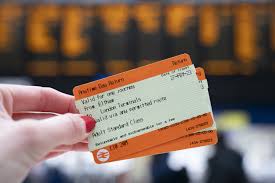
The Ins and Outs of Rail Fares in the UK
When it comes to travelling by train in the UK, understanding rail fares is essential for making informed decisions and getting the best value for your money. With a variety of ticket options available, navigating the world of rail fares can be a bit overwhelming. Let’s delve into the intricacies of rail fares to help you make sense of it all.
Types of Rail Fares
There are several types of rail fares that passengers can choose from, depending on their travel needs:
- Advance Tickets: These tickets are available for purchase in advance and offer significant savings compared to buying on the day of travel.
- Off-Peak Tickets: Off-peak tickets are valid for travel outside of peak hours, usually during quieter times of the day.
- Anytime Tickets: Anytime tickets allow for flexibility, as they can be used at any time on the chosen date.
- Season Tickets: Season tickets are ideal for regular commuters, offering unlimited travel between two stations for a set period.
Saving Money on Rail Fares
To save money on rail fares, consider these tips:
- Book in Advance: Booking your tickets early can result in significant savings.
- Use Railcards: Railcards offer discounts on train travel for various demographics, such as young people, seniors, and families.
- Avoid Peak Times: Travelling during off-peak hours can lead to cheaper fares.
- Consider Split Ticketing: Splitting your journey into multiple tickets can sometimes be more cost-effective than buying a single ticket.
The Future of Rail Fares
The landscape of rail fares is constantly evolving, with initiatives such as flexible season tickets and digital ticketing making it easier for passengers to access affordable and convenient travel options. As technology continues to shape the way we travel, we can expect further innovations in how rail fares are structured and offered to passengers.
In conclusion, understanding the different types of rail fares and knowing how to save money on your train journeys can help you make smart choices when it comes to booking your tickets. By staying informed and taking advantage of available discounts and promotions, you can make your railway adventures both enjoyable and cost-effective.
Common Questions About Rail Fares
- What is the cost of railway ticket?
- What is the cheapest day to buy a train ticket?
- What is a fare train?
- Which country has the cheapest railways?
What is the cost of railway ticket?
The cost of a railway ticket can vary depending on a variety of factors, including the type of ticket you choose, the class of travel, the distance of your journey, and whether you are travelling during peak or off-peak hours. Railway ticket prices are typically structured to accommodate different budgets and travel preferences, with options ranging from advance tickets offering discounted rates for early booking to flexible anytime tickets for those needing more freedom in their travel plans. It’s always advisable to check with the specific train operator or use online booking platforms to get accurate pricing information tailored to your journey requirements.
What is the cheapest day to buy a train ticket?
When it comes to finding the cheapest day to buy a train ticket, the answer can vary depending on various factors such as the specific route, time of travel, and availability of discounts. In general, booking in advance is often a key strategy for securing lower fares, as tickets tend to be cheaper when purchased well ahead of the travel date. Additionally, travelling during off-peak times or avoiding busy periods such as weekends and holidays can also help you find more affordable options. It’s advisable to compare prices across different days and times to identify the most cost-effective option for your journey.
What is a fare train?
A fare train refers to a specific train service that operates at a set fare or price for passengers. This type of train may offer a fixed rate for travel between certain destinations, regardless of factors such as time of booking or peak travel times. Fare trains can provide passengers with predictability and transparency in terms of ticket costs, making it easier to plan and budget for their journeys. By opting for a fare train, passengers can enjoy the convenience of knowing the exact price they will pay for their rail travel experience.
Which country has the cheapest railways?
When it comes to determining which country has the cheapest railways, the answer can vary depending on various factors such as ticket pricing structures, government subsidies, and overall cost of living. Countries like India and some Eastern European nations are often cited for their relatively low rail fares compared to Western European countries. However, it’s important to consider that affordability is just one aspect of a country’s railway system, as factors like efficiency, reliability, and infrastructure quality also play a significant role in providing a comprehensive assessment of a nation’s railway network.
